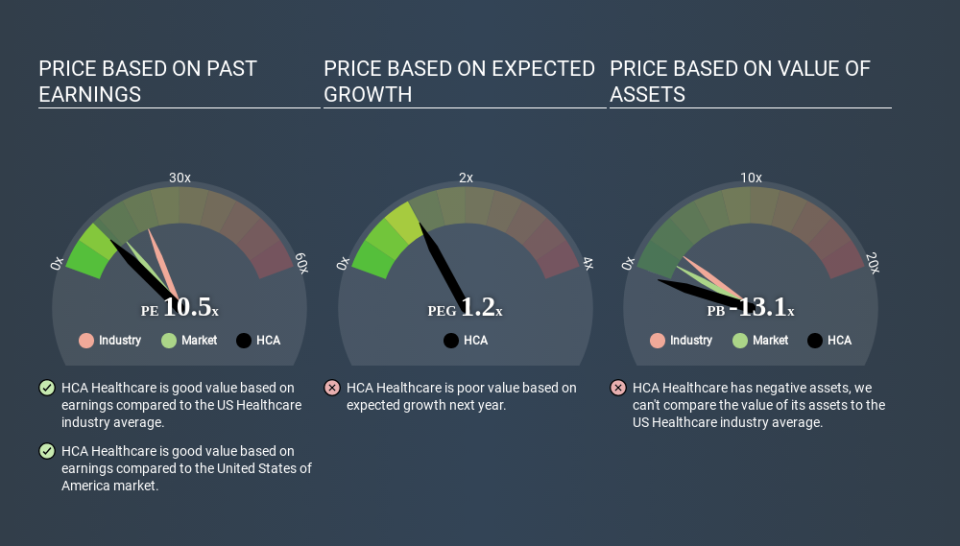How Does HCA Healthcare's (NYSE:HCA) P/E Compare To Its Industry, After Its Big Share Price Gain?

HCA Healthcare (NYSE:HCA) shareholders are no doubt pleased to see that the share price has bounced 59% in the last month alone, although it is still down 27% over the last quarter. The bad news is that even after that recovery shareholders are still underwater by about 6.0% for the full year.
Assuming no other changes, a sharply higher share price makes a stock less attractive to potential buyers. In the long term, share prices tend to follow earnings per share, but in the short term prices bounce around in response to short term factors (which are not always obvious). The implication here is that deep value investors might steer clear when expectations of a company are too high. Perhaps the simplest way to get a read on investors' expectations of a business is to look at its Price to Earnings Ratio (PE Ratio). A high P/E ratio means that investors have a high expectation about future growth, while a low P/E ratio means they have low expectations about future growth.
See our latest analysis for HCA Healthcare
Does HCA Healthcare Have A Relatively High Or Low P/E For Its Industry?
We can tell from its P/E ratio of 10.54 that sentiment around HCA Healthcare isn't particularly high. The image below shows that HCA Healthcare has a lower P/E than the average (21.3) P/E for companies in the healthcare industry.
HCA Healthcare's P/E tells us that market participants think it will not fare as well as its peers in the same industry. Many investors like to buy stocks when the market is pessimistic about their prospects. You should delve deeper. I like to check if company insiders have been buying or selling.
How Growth Rates Impact P/E Ratios
P/E ratios primarily reflect market expectations around earnings growth rates. Earnings growth means that in the future the 'E' will be higher. Therefore, even if you pay a high multiple of earnings now, that multiple will become lower in the future. A lower P/E should indicate the stock is cheap relative to others -- and that may attract buyers.
HCA Healthcare's earnings per share fell by 5.8% in the last twelve months. But over the longer term (5 years) earnings per share have increased by 19%.
Don't Forget: The P/E Does Not Account For Debt or Bank Deposits
Don't forget that the P/E ratio considers market capitalization. That means it doesn't take debt or cash into account. Theoretically, a business can improve its earnings (and produce a lower P/E in the future) by investing in growth. That means taking on debt (or spending its cash).
While growth expenditure doesn't always pay off, the point is that it is a good option to have; but one that the P/E ratio ignores.
Is Debt Impacting HCA Healthcare's P/E?
HCA Healthcare has net debt worth 88% of its market capitalization. If you want to compare its P/E ratio to other companies, you should absolutely keep in mind it has significant borrowings.
The Verdict On HCA Healthcare's P/E Ratio
HCA Healthcare's P/E is 10.5 which is below average (13.2) in the US market. When you consider that the company has significant debt, and didn't grow EPS last year, it isn't surprising that the market has muted expectations. What is very clear is that the market has become more optimistic about HCA Healthcare over the last month, with the P/E ratio rising from 6.6 back then to 10.5 today. For those who prefer to invest with the flow of momentum, that might mean it's time to put the stock on a watchlist, or research it. But the contrarian may see it as a missed opportunity.
Investors have an opportunity when market expectations about a stock are wrong. If the reality for a company is not as bad as the P/E ratio indicates, then the share price should increase as the market realizes this. So this free visual report on analyst forecasts could hold the key to an excellent investment decision.
You might be able to find a better buy than HCA Healthcare. If you want a selection of possible winners, check out this free list of interesting companies that trade on a P/E below 20 (but have proven they can grow earnings).
If you spot an error that warrants correction, please contact the editor at editorial-team@simplywallst.com. This article by Simply Wall St is general in nature. It does not constitute a recommendation to buy or sell any stock, and does not take account of your objectives, or your financial situation. Simply Wall St has no position in the stocks mentioned.
We aim to bring you long-term focused research analysis driven by fundamental data. Note that our analysis may not factor in the latest price-sensitive company announcements or qualitative material. Thank you for reading.

 Yahoo Finance
Yahoo Finance 
